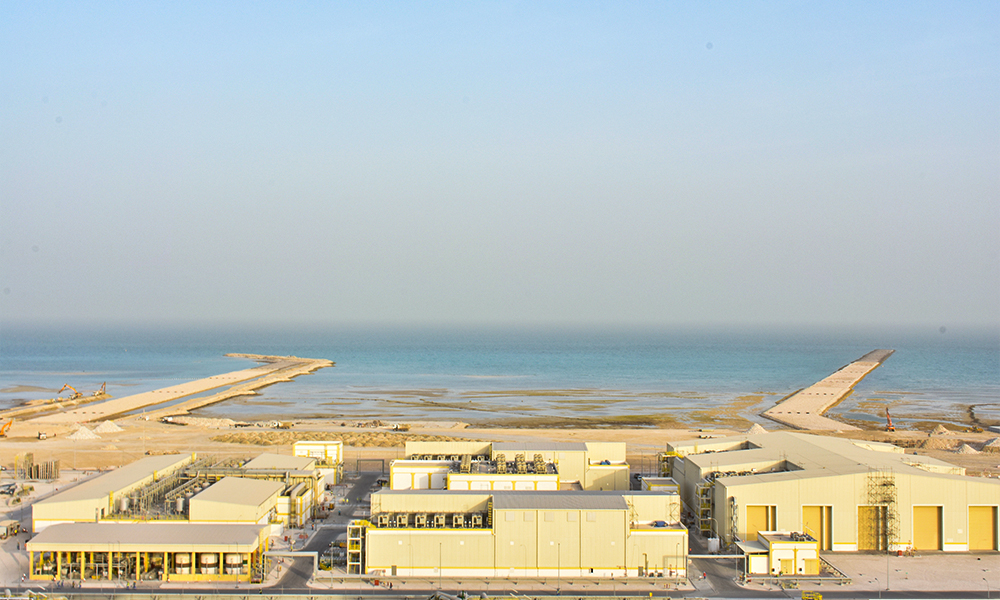Qatar’s Umm Al Houl desalination plant will see an artificial intelligence (AI) project run by Acciona optimise operations and achieve energy saving at the site, reducing carbon emissions.
The project is part of Acciona’s goals to reduce carbon emissions associated with its business activities and will be financed by the global regenerative and decarbonised solutions provider’s dedicated decarbonisation fund, making it one among only 14 projects in the world that have been chosen by Acciona for their potential to significantly reduce carbon emissions.
The Umm Al Houl Seawater Reverse Osmosis plant, which is scheduled to become operational next month, will use a state-of-the-art AI platform called Maestro, to optimise operations and achieve energy saving in particular, said a statement from Acciona.
“Acciona will use AI to lower energy and reagent consumption, which will lower the carbon footprint of the desalination plant. Acciona estimates the use of AI will reduce emissions by 12,000 tons of CO2 per year,” said the statement from the company.
Acciona added that it has been a carbon neutral company since 2016 in its direct operations. In line with the latest climate science, it is committed to reducing its direct and energy consumption emissions by 60% between 2017 and 2030, consistent with the Paris Climate Agreement’s goal of limiting global warming to no more than 1.5ºC above pre-industrial levels, added the company in its statement.
To achieve this goal, the company has launched a decarbonization fund to finance promising projects with the potential to significantly reduce emissions. The AI platform at the Umm Al Houl desalination plant will be the first project in the Middle East to receive support from Acciona’s decarbonisation fund.
The Maestro AI platform processes operational data in real-time to allow predictive, autonomous and continuous optimisation at scale. This is expected to deliver lower operational costs, while maximising output, plant reliability and water quality. The Maestro platform is also scalable, which will allow Acciona to extend the benefits of AI to all its clients in the global water industry as part of its commitment to continuous innovation and service excellence.
Guillermo Hijós, director, O&M Desalination Middle East, said: “The use of AI in desalination is a milestone for the industry. We are just beginning to explore the potential of new technologies but being pioneers means being able to offer a better and more competitive service to our clients.”
Jesús Sancho, managing director, Acciona ME, said: “Acciona places the fight against climate change and its impacts at the top of its business goals. Our ‘Business as Unusual’ approach means that we are constantly seeking to improve our water infrastructure solutions to meet the particular challenges of water scarcity and sustainability in the Middle East.”
Acciona was awarded the design, construction and operation and maintenance of Umm Al Houl SWRO desalination plant in 2015. The plant will produce 564,000 cubic metres of desalinated water per day, enough to serve 1.1 million people, after the start-up of operations at the expanded facility in April. The Umm Al Houl plant represents a milestone in the world of desalination, as it will be the largest facility in Qatar using reverse osmosis technology. To date, only evaporation technology was used to desalinate water.
Acciona manages a water portfolio in the Middle East region that generates more than 2,820,000 m3/day of desalinated seawater once all the facilities are completed.
According to International Energy Agency’s World Energy Outlook, total production of desalinated water in the Middle East region will be 13 times higher in 2040 than in 2014. In a region with serious water shortages, the demand for desalinated water is growing in response to climate change and an increasing population.
Acciona is a world leader in desalination through reverse osmosis technology, which emits 6.5 times fewer greenhouse gases than conventional thermal desalination processes.

